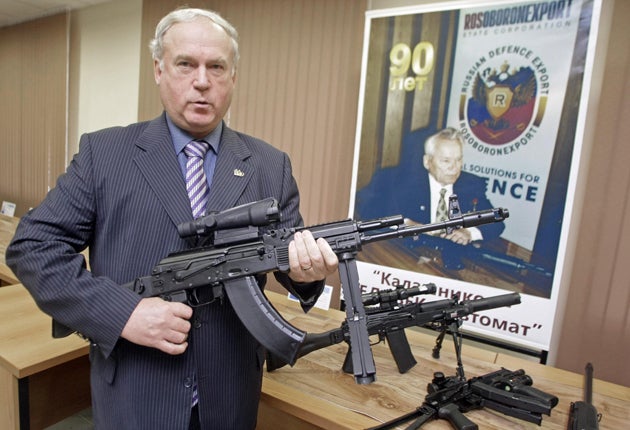Russia cracks down on fake Kalashnikovs
State says only half of 100 million AK-47 rifles are Russian-made models

Russia has been a major market for counterfeit music, movies and computer programs from around the world, but at least one Russian product has been pirated worldwide: the Kalashnikov AK-47 assault rifle.
But Anatoly Isaikin, the chief of the nation's state arms-trading monopoly, aims to change that. He says Russia will step up action to defend the copyright of the Kalashnikov, which is made without licence by dozens of manufacturers around the world.
The Kalashnikov has become the world's most widely distributed weapon, with some 100 million made in the 60 years since the AK-47 went into serial production, but only about half of them are the genuine, locally made article.
The counterfeit production of Kalashnikovs outside Russia has incurred financial losses, tarnished the brand because of their poor quality and dented the country's prestige abroad, Mr Isaikin said on Thursday.
"Their quality bears no comparison to a Kalashnikov produced in Russia," he told reporters at a shooting range in the town of Klimovsk, 15 miles south of Moscow. He said his company, Rosoboronexport, was working to draft agreements with foreign countries that would protect copyright for Kalashnikovs and other Russian weapons. There are about 30 foreign manufacturers who are currently making Kalashnikovs, he said. "Together with other federal structures, we are taking steps to establish order," said Mr Isaikin.
The Soviet Union paid little attention to copyright laws, handing out arms production licences to its satellites in eastern Europe and elsewhere. The Cold War-era production licences have long-since expired, but production has continued.
It wasn't until 1997 that the Izhmash factory in the Ural Mountains city of Izhevsk, which makes Kalashnikovs, secured a state patent for the weapon and began pressing foreign manufacturers to respect its copyright.
Izhmash director Vladimir Grodetsky said the company has faced an uphill battle, losing an estimated $400m (£245m) a year from counterfeit Kalashnikov makers. He said Venezuela, which has struck a deal to buy 100,000 rifles and produce more under licence, is now the only fully legitimate licence holder.
Other Kalashnikov makers, including eastern European nations and China, have signaled readiness to respect Russian copyright but have said that the deals should be negotiated on a government level, Mr Grodetsky said. The Soviet Union provided China with weapons technology until the two Communist giants turned into bitter rivals in the 1960s. Moscow and Beijing rebuilt their ties in the early 1990s, and China again became a top customer for Russian weapons. But China has reduced purchases of Russian weapons in recent years.
Join our commenting forum
Join thought-provoking conversations, follow other Independent readers and see their replies
Comments
Bookmark popover
Removed from bookmarks